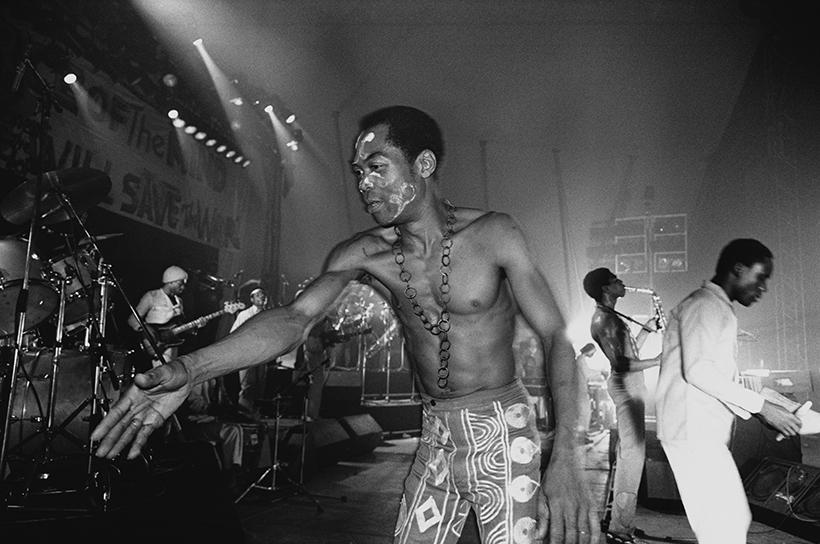
Who is Fela Kuti?
Before we even get started, LISTEN to Fela Kuti’s “Lady” off Shakara via Soundcloud.
Now read a bit of his bio:
“Over a decade after his death, vindication has come to Fela Kuti, Africa’s musical genius. AfroBeat, his gift to the world, is now an international staple on his own uncompromising terms, social content intact.
Throughout his life, Fela contended that AfroBeat was a modern form of danceable, African classical music with an urgent message for the planet’s denizens. Created out of a cross-breeding of Funk, Jazz, Salsa and Calypso with Juju, Highlife and African percussive patterns, it was to him a political weapon.
Fela refused to bow to the music industry’s preference for 3-minute tracks, nor did he buckle under entreaties to moderate his overwhelmingly political lyrics. He went down in 1997 still railing against the consumerist gimmicks that taint pop music, with the aim, he felt, of promoting and imposing homogeneous aesthetic standards worldwide, thereby inducing passivity.
The fact that AfroBeat is today globally winning hearts in its original form – lengthy, ably crafted, earthy compositions laced with explicitly political lyrics – suggests that Fela’s purgatory on earth may have served to awaken a sensibility in people to appreciate authenticity and substance.”
October also marks Felabration month. Felabrations are the annual celebrations that commemorate the life and music of the late Fela Anikulapo Kuti. The first Felabration, the brainchild of Fela’s eldest child Femi Kuti and his sister Yeni, was created nearly a decade ago. It was a week-long series of events held at the atmospheric 2,500 capacity New Afrika Shrine in Lagos, Nigeria. Felabrations have now expanded all over the world– last year there were over 20 held across the United States, Europe, and Africa as well as Indonesia and Japan. Afrobeat fans and artists (both big and small) have joined the parties, including Damon Albarn, Flea, Third World, Ziggy and Rita Marley.
Felabration Boston 2016 takes place Oct. 15 at the Middle East Restaurant and Nightclub. Themusic starts at 8. Click HERE for more information.
And once you’ve been bitten by the Fela bug, you can start exploring his collected works on CD and vinyl. Since 2011, Knitting Factory Records has released three limited edition Fela Kuti Box Sets curated by musicians who are long-time admirers of Nigerian icon and Afrobeat originator Fela Anikulapo Kuti. The first by Questlove, second by Ginger Baker and the most recent by Brian Eno.
On October 14th, seven individual vinyl reissues from the Brian Eno-curated Fela Kuti Box Set (#3) will be available via Knitting Factory Records. Eno’s album selections span the ten years in which Fela’s afrobeat progressed from its formative stage to a rich maturation of the form. It begins with 1971’s Shakara and ends with 1980’s I.T.T.(International Thief Thief). It also includes London Scene (1972), Afrodisiac, Gentleman (both 1973) and Upside Down (1976). The ultimate selection is 1976’s Zombie, which was a huge hit in Nigeria. All of the albums are pressed on 180 gram vinyl.
On discovering Fela Kuti, Eno says: “Before about mid-September 1973 I didn’t have much interest in polyrhythmic music. I didn’t really get it. That all changed one autumn day when I walked into Stern’s Record Shop off Tottenham Court Road. For reasons I’ve long forgotten, I left the store with an album that was to change my life dramatically. It was Afrodisiac by Fela Ransome-Kuti (as he was then known) and his band The Africa 70. I remember the first time I listened and how dazzled I was by the groove and the rhythmic complexity, and by the raw, harsh sounds of the brass, like Mack trucks hurtling across highways with their horns blaring. Everything I thought I knew about music at that point was up in the air again. The sheer force and drive of this wild Nigerian stuff blew my mind. My friend Robert Wyatt called it ‘Jazz from another planet’ – and suddenly I thought I understood the point of jazz, until then an almost alien music to me.”


